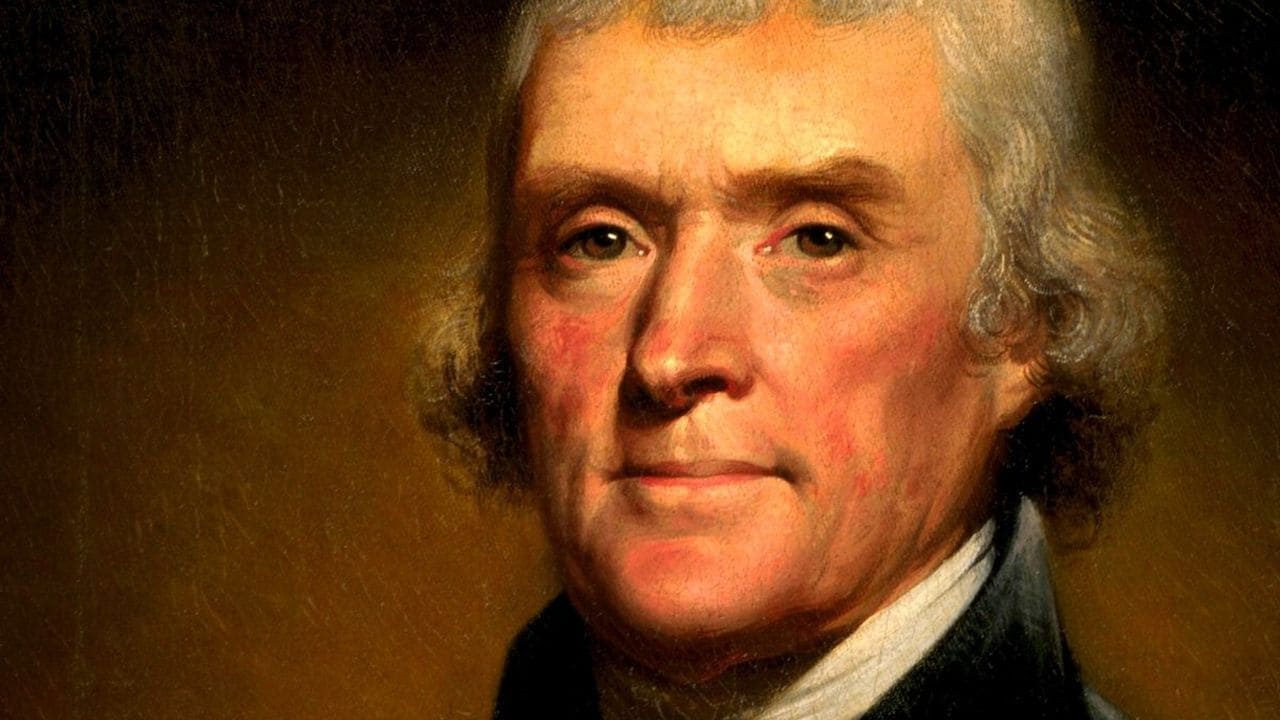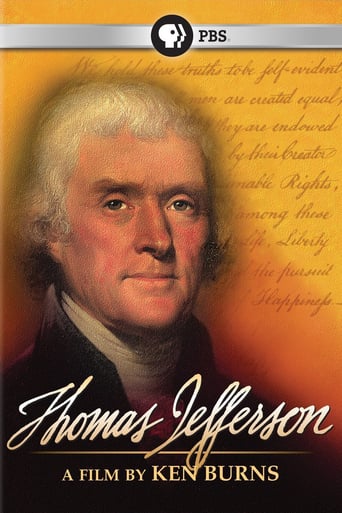Robert J. Maxwell
This was produced by Ken Burns, whose documentary on the Civil War was a revolutionary undertaking in terms of technique and approach. I don't suppose "Jefferson" had the same budget because it's not as satisfying.The narrator is Ossie Davis and he's expressive enough, although his voice sounds as if it's beginning to gargle with age, and it lacks David McCullough's tone of resigned objectivity, as he dispassionately announces a great tragedy.And in my expert opinion -- "expert" in the sense of once having heard the name "Thomas Jefferson" mentioned -- too much time is given over to Jefferson's obsession with his home, Monticello, in Virginia. It's possible to get tired of looking at spinning wheels sitting placidly on highly polished wooden floor.And, okay, Jefferson went through all kinds of tribulations as he aged. Don't we all. And he kept slaves too, one of whom, Sally Hemmings, the talking heads hint he may have slept with. Well, according to the recent DNA evidence, there's no reason to hint that he did -- because he did, and the congress produced six children.None of this demeans Jefferson himself. He was a man of his time. Judged in retrospect, his aim seems to have been to reproduce the social structure of his family's source region. He wasn't a rabid slaver. He saw the political ideal as a model of the English aristocracy, semi independent, benign, free-flowing, patronizing, given to science and invention, and above all peaceful. Not a bad model if you're the aristocrat in charge.The first half deals not just with Jefferson's childhood and upbringing but outlines the formation of his paradoxical political views and his fierce conflict with representatives of opposing sentiments like John Adams and Alexander Hamilton. They wanted a strong central government. Jefferson, concerned as he was with "freedom," saw it best expressed in a looser confederation of states or even agrarian manors. He hated cities with their diversity and industries. A gentleman's life was a farmer's life. The argument between the two points of view is as bitter today as it was then.That, I think, is the main weakness of the program. The Louisiana Purchase, which Jefferson wrought, did everything that he opposed -- national expansion, monstrous debt, and acute disagreements over the westward spread of slavery, which led finally to you-know-what. The Louisiana Purchase is sloughed off in about four minutes.Jefferson was a human being, and a fascinating one, but beyond that he was a politician and a theorist, a founder, a writer of our charter documents. I'm sorry that his granddaughter was deserted by her husband, and that Jefferson could never make up his mind to finish Monticello, but those facts of his life don't deserve the attention that his career in the sociopolitical arena deserve.Also, there is no mention of Jefferson's bringing ice cream recipes back from France! What flavors did he favor? Not vanilla. The beans at the time could only be gotten from Tahiti!Speaking editorially, the internet and street demonstrations have copped a quotation that Thomas Jefferson used in talking about George I. "The Tree of Liberty Must Be Watered With The Blood of Tyrants." Only now the reference is not to the King of England but to the president of the United States, a tyrant in some eyes, who disregards the Constitution.There's another quote from Jefferson that nobody ever seems to hear:"Some men look at constitutions with sanctimonious reverence, and deem them like the ark of the covenant, too sacred to be touched. They ascribe to the men of the preceding age a wisdom more than human, and suppose what they did to be beyond amendment. I knew that age well; I belonged to it, and labored with it. It deserved well of its country. It was very like the present, but without the experience of the present; and forty years of experience in government is worth a century of book-reading; and this they would say themselves, were they to rise from the dead. I am certainly not an advocate for frequent and untried changes in laws and constitutions. I think moderate imperfections had better be borne with; because, when once known, we accommodate ourselves to them, and find practical means of correcting their ill effects. But I know also, that laws and institutions must go hand in hand with the progress of the human mind. As that becomes more developed, more enlightened, as new discoveries are made, new truths disclosed, and manners and opinions change with the change of circumstances, institutions must advance also, and keep pace with the times. We might as well require a man to wear still the coat which fitted him when a boy, as civilized society to remain ever under the regimen of their barbarous ancestors."
pmcguireumc
Any movie that features George Will in the first 10 minutes is worth watching, in my opinion. Will, like Jefferson, is a great, multifaceted thinker. Oh, by the way, did you know Jefferson owned slaves. This is, like all of Ken Burn's films, a wonderful collection of diary readings, oil paintings, heart felt music, warm narration, and thought provoking. Oh, by the way, did you know Jefferson owned slaves. As a huge fan of our nation's first and greatest thinker, I was very hopeful about this film, especially when I saw that Ken Burns produced it. However, the modern political correctness constantly invoked when it comes to the issue of slavery is incredibly distracting. There were almost 25 references to Jefferson's owning slaves in the first 28 minutes. Oh, by the way, did you know Jefferson owned slaves. As long as you can tolerate the repeated onslaught of political correctness (not that this is unexpected from PBS), you will be interested in this documentary.My criticism of course, is the ridiculous interpretation of the past through modern sensibilities. The cost of this however, is a minimal study of America's most enigmatic and great thinker. Oh, by the way, did you know Jefferson owned slaves.
njmollo
Thomas Jefferson by Ken Burns is a reverential documentary but never out of ones mind is that this man of "extraordinary intelligence" deemed the black inferior to the white.This question, probably the most important, is exposed but left unresolved. The only historian to put Jefferson's attitude into any context is a black one.The white historians list Jefferson's many qualities and his desire for "a pursuit of happiness" but each positive quality they list can be juxtaposition with the word "slave".Almost presented as religious scripture, the life of Thomas Jefferson and his ideals are quoted from his documents and letters but it is often forgotten that this man was a politician first and foremost and being so, could easily be classed as a man of malleable and corrupt principles. Is there one politician through out history that was not in some way corrupt?What must be remembered is that when Jefferson uses the word "people"; he is not including the African American. For historians to presume that his carefully crafted words apply to all is a mistake. I for one cannot reconcile the man and his beliefs. To state high principles in published prose yet live the life of a slave owner does not sit easily. His words become far less principled in light of the man's example. Do as I say not as I do.
seepruittsplace
In reading this review I find myself asking what this viewer is really looking for. In one voice we are told the production show Jefferson "warts and all" and in the next appears to condemn the work for showing he was a Southern with slaves and that his relationship with those slaves (i.e. Sally Hemings) and his animosity towards other "Founding Fathers" as inappropriate at the least and cruel at the worst. This viewer states more of Jefferson's own words should have been used - which would have been wonderful, but if this viewer truly knew Jefferson's history, this viewer would also know that Jefferson destroyed nearly everything he had ever written about or two anyone along with nearly everything anyone wrote to him. Therefore we can only piece together a picture of this man by others of the period who wrote "about" him, not necessarily to him as well as records found in France, England and our own Archives. An American who wishes to examine American history is hard pressed to find the facts which would make our history clear and easy to understand and perhaps that is for the better as it forces us to look closely and most of all to think.

